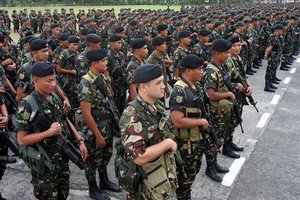Philippines: Senate calls for Cancellation of Visiting Forces Agreement (VFA) with Washington

Senators are inclined to abrogate the existing Visiting Forces Agreement (VFA) with the United States, citing allegations that US troops are going beyond military exercises and have extended their presence in actual combat operations in Mindanao.
Senators Miriam Defensor Santiago, Joker Arroyo and Francis Pangilinan cited scores of loopholes in the agreement, one of which is the alleged involvement of US troops in combat which they described as unconstitutional.
Adminsitration officials led by Executive Secretary Eduardo Ermita and Foreign Affairs Undersecretary Enrique Manalo defended the agreement, citing the many advantages and benefits that the VFA provides for the country particularly for the military.
Santiago, who heads the legislative oversight committee on the VFA, said she will recommend to the Senate the abrogation of the agreement.
“My reference is Col. David Maxwell, commander of the Joint Special Operations Task Force Philippines,” Santiago said.
She cited the publication “Focus on the Global South” which quoted Maxwell as saying: “The Philippine Constitution does not prohibit combat operations and provides an exception to this, if there is a treaty in force.”
“By his own admission, Col. Maxwell is using the Task Force to engage in battle in Mindanao in the US war against terrorism, which includes the Abu Sayyaf and the Jemaah Islamiyah,” Santiago said, adding that global terrorism is a US concern and not of the Philippines.
However, Rep. Antonio Cuenco of Cebu, joint chairman of the oversight committee, said Congress is not ready for outright abrogation of the VFA.
“We’re not ready to do that. We shall have to renegotiate it,” he said.
Santiago said that although RP and US authorities claim US troops in Mindanao are only engaging in so-called military exercises, this term is not used in the VFA itself.
“The VFA never uses the term military exercises. Instead, it uses the word activities. This is the loophole in the VFA,” she said.
Santiago said she suspects that there are “small-scale military bases” in Zamboanga City and in Sulu.
“If the US wants to use Philippine territory in its alleged war on terror, they will have to negotiate a treaty with the RP. In the meantime, in my humble view, the presence of US troops in Mindanao, and even worse, their participation in combat operations, are illegal,” she said.
For his part, Arroyo said there is a need to thoroughly review the agreement.
The senators’ opposition to the VFA was further prompted by the revelation of Navy LtSG Nancy Gadian who stated that US troops stationed in Mindanao have been active in combat operations with the Philippine military.
Gadian, a whistleblower on an alleged fund mess in the RP-US Balikatan exercises in 2007, also confirmed during yesterday’s hearing that US forces are indeed taking part in combat.
“During encounters in the actual terrain, embedded po yung sundalong Amerikano (US soldiers were embedded in local units),” Gadian told Pangilinan.
Gadian, who was head of Civil Military Operations Task Group of Balikatan in 2007, said that about 500 US soldiers were assigned in Mindanao as “the first line of defense against the enemy” and maintain permanent camps in the island.
She added that US troops usually engage in operations in Mindanao without informing heads of the Philippine military in the area.
The VFA was signed during the term of former President Joseph Estrada.
Under the agreement, it allows US troops to come to the Philippines for military training exercises — dubbed Balikatan exercises — with their local counterparts.
Representatives Rafael Mariano of Anakpawis and Neri Colmenares of Bayan Muna, meanwhile, called for an immediate inspection of at least four military camps in Mindanao where US troops have allegedly built permanent and temporary structures.
Mariano said the structures must be dismantled because their construction was “a direct affront to the country’s sovereignty.”
“The existence of US military structures in Mindanao and the purported role of US forces in combat are the strongest grounds to terminate the lopsided and highly onerous VFA,” he said.
Colmenares said the legislative oversight committee on the VFA should conduct an immediate inspection of Camp Navarro and Andrews Air Base in Zamboanga, Camp Siongco in Maguindanao, and Camp Bautista in Jolo, Sulu.
In her affidavit, Gadian said the US military has permanent structures in Mindanao “with fixed foundations made of concrete and cannot be easily removed.”
She said that since 2002, the Americans had temporary, as well as two permanent, structures in Camp Navarro, the headquarters of the AFP Western Mindanao Command in Calarian, Zamboanga City. The headquarters of the US Joint Special Operations Task Force-Philippines (JSOTF-P) is also at Camp Navarro.
In Camp Malagutay, Barangay Malagutay, Zamboanga City, US troops have occupied some 200 to 300 square meters of land where they maintain temporary structures, constructed out of plywood and GI sheets, they use as offices, Gadian added.

